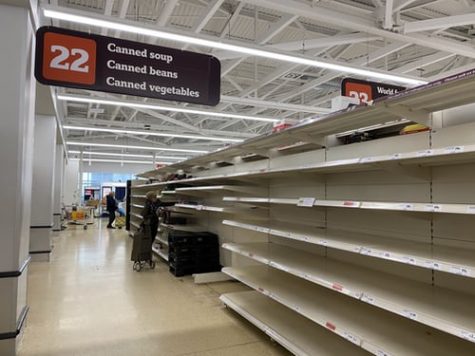Adjusting to new realities
LZ students concerned as grocery stores transition to new era

As panic buying becomes an ongoing problem in Lake Zurich, empty shelves have become a common scene in grocery stores. Karlie Schwichtenberg, a junior whose family has struggled to get items at stores, says this hoarding is ridiculous and dangerous.
Barren shelves, picked over displays, and disorganized aisles are just a few of the many bleak descriptions of nearby grocery stores like Jewel and Mariano’s in the coronavirus crisis.
These descriptions are the result of local shoppers scrambling to stock up on basic necessities in the quarantine. This hurried race for paper goods, food, and sanitizers is not just evident in the empty shelves, but in the worried expressions of shoppers, Caitlin Brennan, junior who shops frequently for herself and family, said.
“[Grocery stores] are definitely weird now, [the quarantine] changed the demeanor of people. For example, if you went to a store five months ago, everyone was just kind of relaxed, just getting their groceries and going about their day,” Brennan said. “But now I feel like people are buying food like it’s their last time buying food ever, and they are preparing for the apocalypse.”
This preparation for a doomsday situation has created unfair situations for everyday Americans, and those who are more at risk, says junior Karlie Schwichtenberg, whose family has struggled to get everyday items. The anxiety over preparing for the worst has resulted in the hoarding of items that people need, something Schwichtenberg finds foolish.
“It’s so frustrating that you go to the grocery store and there’s nothing left because people are hoarding it. It’s just not fair, and it creates a more dangerous situation,” Schwichtenberg said. “There are some over the counter medicines that people actually need, but now because other people are hoarding it and buying it in a panic, those people who need that medicine are put at risk. And people who are on strict diets just can’t get what they need. That’s just not fair.”
Such panic buying does not only impact those at risk but impacts average shoppers as well, Schwichtenberg said. Those consumers who are not changing their habits to stock up on everything at once may be unable to get things like “chicken or ice cream,” she said. Schichtenberg said her family has had trouble getting “basic things, and it’s just annoying because we need to get creative, and figure out other things to cook.”
Swarming grocery stores to hoard as many items as possible does not just create unfair situations for certain families, but puts both shoppers and employees at risk of being infected, according to a recent ProPublica article. The new situation of loosely regulated shopping contrasts the social distancing measures people are trying to follow, the news website said.
People are weaving back and forth “in crowded aisles and fighting over frozen food,” the article said. While at the same time, “Epidemiologists and doctors have been warning the public for days that braving crowds for any reason is a gamble.”
While staying away from crowds, in general, is likely the best option, Brennan, who grocery shops often, says that grocery stores have put some initiatives in place that try to keep customers safe. Though having “a lot of people at the stores increases the chance of the virus spreading,” stores are trying to prevent spread by “providing wipes, so people can wipe down their carts before they shop, which is good.”
While people should be thinking about sanitation as they shop, they should also be thinking about the needs of others, Schwichtenberg said. And, she argues, the coronavirus crisis has shown the true colors of people, both inside the grocery store and out.
“People claim to be good but the second they are faced with danger, they completely lose their morals. I just feel like it says a lot about people that the second there’s a threat like this, instead of helping each other, we fight each other,” Schwichtenberg said. “But there’s such a contrast because there are so many people who are donating and doing everything they can to help, but at the same time people are so vicious in these stores: it’s everyone for themselves.”

As a senior, this is Max’s third year on staff and first year as magazine editor in chief for the Bear Facts program. He aspires to study environmental...
